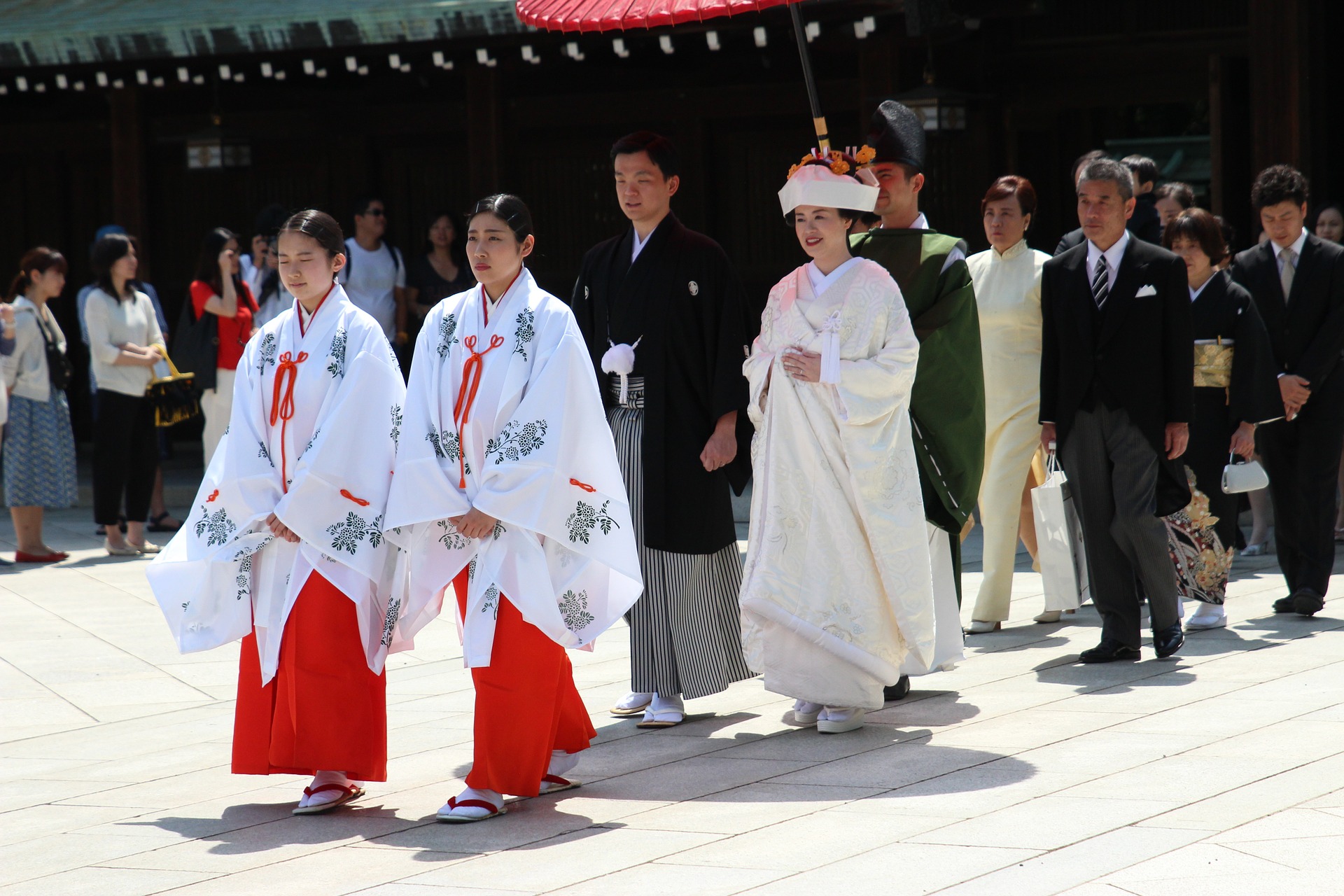LESSON GOAL
Let’s check our lesson goal.
In this material, you will learn advanced English conversation and vocabulary words about weddings.
In this material, you will learn advanced English conversation and vocabulary words about weddings.
このレッスンのゴールを確認しましょう。
この教材では、結婚式について話すときに使う単語と会話を練習をします。
この教材では、結婚式について話すときに使う単語と会話を練習をします。
PART A_1
Look at the picture below and answer the questions to describe it.
PART A_2

| 1. | What can you see in the picture? |
| Answer: | |
| 2. | What are the people doing in the picture? |
| Answer: |
PART B_1
Let’s talk. Please answer my questions. You may ask me questions, too.
PART B_2
| 1. | Have you been to a wedding ceremony? What have you observed? |
| Answer: | |
| 2. | Would you like a traditional or a modern wedding ceremony? |
| Answer: | |
| 3. | Do you think it is okay not to invite all of your friends to your wedding? Why or why not? |
| Answer: | |
| 4. | If you could be married in another country, where would you like it to be and why? |
| Answer: | |
| 5. | Nowadays, people spend a lot of money on weddings. Do you agree or disagree with that? |
| Answer: | |
| 6. | What things should a person consider before getting married? |
| Answer: | |
| 7. | If you could only invite five people to your wedding, who would they be and why? |
| Answer: | |
| 8. | How would you describe a perfect wedding day? |
| Answer: | |
| 9. | What is your ideal wedding party? |
| Answer: | |
| 10. | What presents would you like to receive on your wedding day? |
| Answer: |
PART C_1
Let’s read the meaning and examples of each word aloud. Please repeat after me.
PART C_2
| 1. | veil |
| meaning: | [noun] a piece of thin cloth that a woman wears over her head or face |
| example: | The long veil of the bride looks very elegant. |
| 2. | tie the knot |
| meaning: | [idiom] to get married |
| example: | The couple is planning to tie the knot next year. |
| 3. | civil |
| meaning: | [adjective] relating to the ordinary people of a country and not to military organizations |
| example: | My parents were married in a civil ceremony. |
PART D_1
Make sentences using the given vocabulary words.
PART D_2
| 1. veil | |
| Answer: | |
| 2. tie the knot | |
| Answer: | |
| 3. civil | |
| Answer: |
REVIEW AND FEEDBACK
Now, let us review the things that you learned in this lesson.
ではこのレッスンで学んだことを振り返りましょう。
(Please give a short feedback on how your student did on your class.)
| Grammar 文法 |
Pronunciation 発音 | Vocabulary 単語 |
Comprehension 理解 |
|
|---|---|---|---|---|
 GOOD GOOD |
文法の誤りはほとんどなく、完全な文章で話すことができる | ほとんどの単語をはっきりと正しく発音することができる | 習った表現を適切に使うことができる | 文章を理解し、質問に正しく答えることができる |
 FAIR |
文法の誤りはあるが、完全な文章で話すことができる | 発音の練習が必要な言葉がいくつかある | たまにミスはあるが、習った表現を適切に使うことができる | 文章を完全に理解するのは難しく、質問に正しく答えられないときもある |
 POOR |
文章で話すのは難しく、単語だけで話すことができる | 発音の練習が必要である | 習った単語と表現を少しだけ使うことができる | 文章を理解するのは難しく、質問に答えるのは難しい |
レッスン教材に関するアンケートのお願い
レッスン教材の改善・拡充を図ることを目的とし、アンケートを実施しております。
以下のURLからアンケートにお答えいただき、 ご意見・ご要望をお聞かせください。
アンケートはこちら